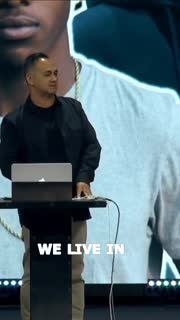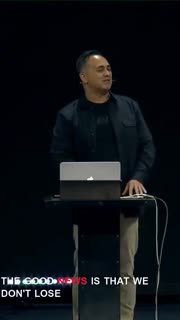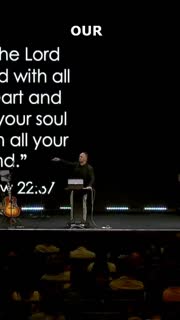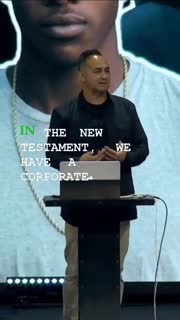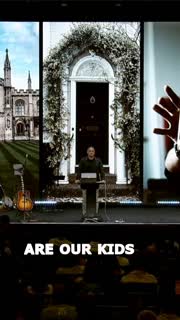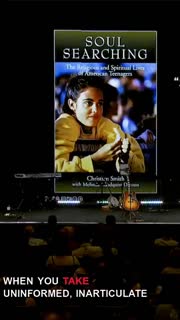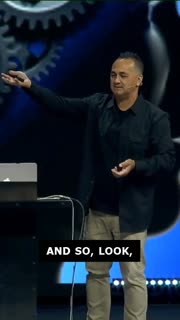Empowering the Next Generation in Faith Together
Devotional
Sermon Summary
Bible Study Guide
Sermon Clips
### Quotes for Outreach
1. "We live in 21st century American culture that is overly individualistic, where I just think about me and my immediate family, and that's about it. That is not the biblical picture that's painted for us in the New Testament. In fact, when you think about the two primary ways in which the church is described, the analogy that's described, there's two primary ones. One is the body, right? The body is constantly being appealed to as an analogy for how the church is supposed to function, and you need all the parts." [02:55] (42 seconds)
2. "The good news is that we don't lose hope. Given the truth of what we believe, we never lose hope. We don't despair. So if you're feeling kind of despairing, hey, that's not the proper response. For those of us who follow Jesus, we know that none of these cultural challenges are going ever put Jesus back in the grave. Okay? So we are people who always hope. But we have work to do." [17:14] (29 seconds)
3. "What is our goal with the next generation? What's our primary goal? Is it to raise them so that they do well academically and can graduate from high school with good grades and go off to a good college so that they can go get a job and then get a good job that pays them enough so they can accumulate wealth and homes and things like that and have all the comforts of life? Is that our goal? Because frankly, that may be how most of us are living." [19:18] (27 seconds)
4. "The goal of life, no matter what you do, is to love God and love neighbor. And if our education doesn't get us to that, then it's failed us. And so that is the view that we should have. Love God. And then, what does Deuteronomy say? You impress that on them everywhere you go. That's not just a Sunday morning thing or a Wednesday night youth group thing. That's when you sit down and lie down and stand up and when you're walking. It's all of life that we are to be passing on a love of God." [20:01] (38 seconds)
5. "Think about a passage like 2 Corinthians 10 3-5. Paul tells us that we are in a war. For though we live in the world, we do not wage war as the world does. Now let me just pause. Sometimes Christians get a little uncomfortable with the warfare kind of language and motif, but number one, it's biblical. It's biblical. We are in a war. And I think number two, it helps us to realize that we are in a serious struggle right now." [22:03] (28 seconds)
### Quotes for Members
1. "In the New Testament, we have a corporate responsibility for raising, raising up the next generation. That includes all of us. In fact, I'm going to argue here that more and more, we need strong churches and families together to equip the next generation to walk into this challenging culture. So this is a message for all of us, because all of us have a stake in the next generation and a responsibility for the next generation." [02:55] (36 seconds)
2. "Are our kids ready for these kinds of challenges? Just thinking through those headlines. Are our kids ready to navigate all those kind of headlines? Are they ready to handle a direct assault on their faith from the college professor? Here's what we discover. You can look at all kinds of data on this, but I would say it's safe to think that most Christians who grow up in the church are not ready." [12:27] (31 seconds)
3. "When you take uninformed, inarticulate Christian students who don't know what they believe or why they believe it and you put them in an aggressive, secular, hostile culture, how do you think that turns out for us? Kids walk away in droves and you have different studies that say, look, it's anywhere between 50 and probably 75% of young people who grow up in the church will eventually walk away or will eventually walk away." [14:00] (29 seconds)
4. "And here's what we found over the last about 100 years of American evangelical Christianity. It has become so anti-intellectual? It's so anti-intellectual that when I give a message like this, people like, look at me strange. Like, wow, it sounds really intellectual. Well, maybe it's because we've been conditioned by an American Christianity that's so anti-intellectual." [24:36] (26 seconds)
5. "And so, look, let me give you an illustration. If you said to me, hey, Brett, tell me about your wife. And I said, oh, let me tell you about my wife, Erin. Oh, she's five foot six. She's got, you know, brown hair. She's got two eyeballs. Yeah, that's my wife. Yeah, you would laugh, and you would say, no, no, no, Brett, tell me, no, really, tell me about your wife. And if I said to you, mm, that's about all I got for you. That's all I can tell you. That's what I know about her. Would you not draw conclusions about the nature of our relationship and the nature of our experience of each other? Absolutely." [28:59] (42 seconds)
Ask a question about this sermon
1. "We live in 21st century American culture that is overly individualistic, where I just think about me and my immediate family, and that's about it. That is not the biblical picture that's painted for us in the New Testament. In fact, when you think about the two primary ways in which the church is described, the analogy that's described, there's two primary ones. One is the body, right? The body is constantly being appealed to as an analogy for how the church is supposed to function, and you need all the parts." [02:55] (42 seconds)
2. "The good news is that we don't lose hope. Given the truth of what we believe, we never lose hope. We don't despair. So if you're feeling kind of despairing, hey, that's not the proper response. For those of us who follow Jesus, we know that none of these cultural challenges are going ever put Jesus back in the grave. Okay? So we are people who always hope. But we have work to do." [17:14] (29 seconds)
3. "What is our goal with the next generation? What's our primary goal? Is it to raise them so that they do well academically and can graduate from high school with good grades and go off to a good college so that they can go get a job and then get a good job that pays them enough so they can accumulate wealth and homes and things like that and have all the comforts of life? Is that our goal? Because frankly, that may be how most of us are living." [19:18] (27 seconds)
4. "The goal of life, no matter what you do, is to love God and love neighbor. And if our education doesn't get us to that, then it's failed us. And so that is the view that we should have. Love God. And then, what does Deuteronomy say? You impress that on them everywhere you go. That's not just a Sunday morning thing or a Wednesday night youth group thing. That's when you sit down and lie down and stand up and when you're walking. It's all of life that we are to be passing on a love of God." [20:01] (38 seconds)
5. "Think about a passage like 2 Corinthians 10 3-5. Paul tells us that we are in a war. For though we live in the world, we do not wage war as the world does. Now let me just pause. Sometimes Christians get a little uncomfortable with the warfare kind of language and motif, but number one, it's biblical. It's biblical. We are in a war. And I think number two, it helps us to realize that we are in a serious struggle right now." [22:03] (28 seconds)
### Quotes for Members
1. "In the New Testament, we have a corporate responsibility for raising, raising up the next generation. That includes all of us. In fact, I'm going to argue here that more and more, we need strong churches and families together to equip the next generation to walk into this challenging culture. So this is a message for all of us, because all of us have a stake in the next generation and a responsibility for the next generation." [02:55] (36 seconds)
2. "Are our kids ready for these kinds of challenges? Just thinking through those headlines. Are our kids ready to navigate all those kind of headlines? Are they ready to handle a direct assault on their faith from the college professor? Here's what we discover. You can look at all kinds of data on this, but I would say it's safe to think that most Christians who grow up in the church are not ready." [12:27] (31 seconds)
3. "When you take uninformed, inarticulate Christian students who don't know what they believe or why they believe it and you put them in an aggressive, secular, hostile culture, how do you think that turns out for us? Kids walk away in droves and you have different studies that say, look, it's anywhere between 50 and probably 75% of young people who grow up in the church will eventually walk away or will eventually walk away." [14:00] (29 seconds)
4. "And here's what we found over the last about 100 years of American evangelical Christianity. It has become so anti-intellectual? It's so anti-intellectual that when I give a message like this, people like, look at me strange. Like, wow, it sounds really intellectual. Well, maybe it's because we've been conditioned by an American Christianity that's so anti-intellectual." [24:36] (26 seconds)
5. "And so, look, let me give you an illustration. If you said to me, hey, Brett, tell me about your wife. And I said, oh, let me tell you about my wife, Erin. Oh, she's five foot six. She's got, you know, brown hair. She's got two eyeballs. Yeah, that's my wife. Yeah, you would laugh, and you would say, no, no, no, Brett, tell me, no, really, tell me about your wife. And if I said to you, mm, that's about all I got for you. That's all I can tell you. That's what I know about her. Would you not draw conclusions about the nature of our relationship and the nature of our experience of each other? Absolutely." [28:59] (42 seconds)
